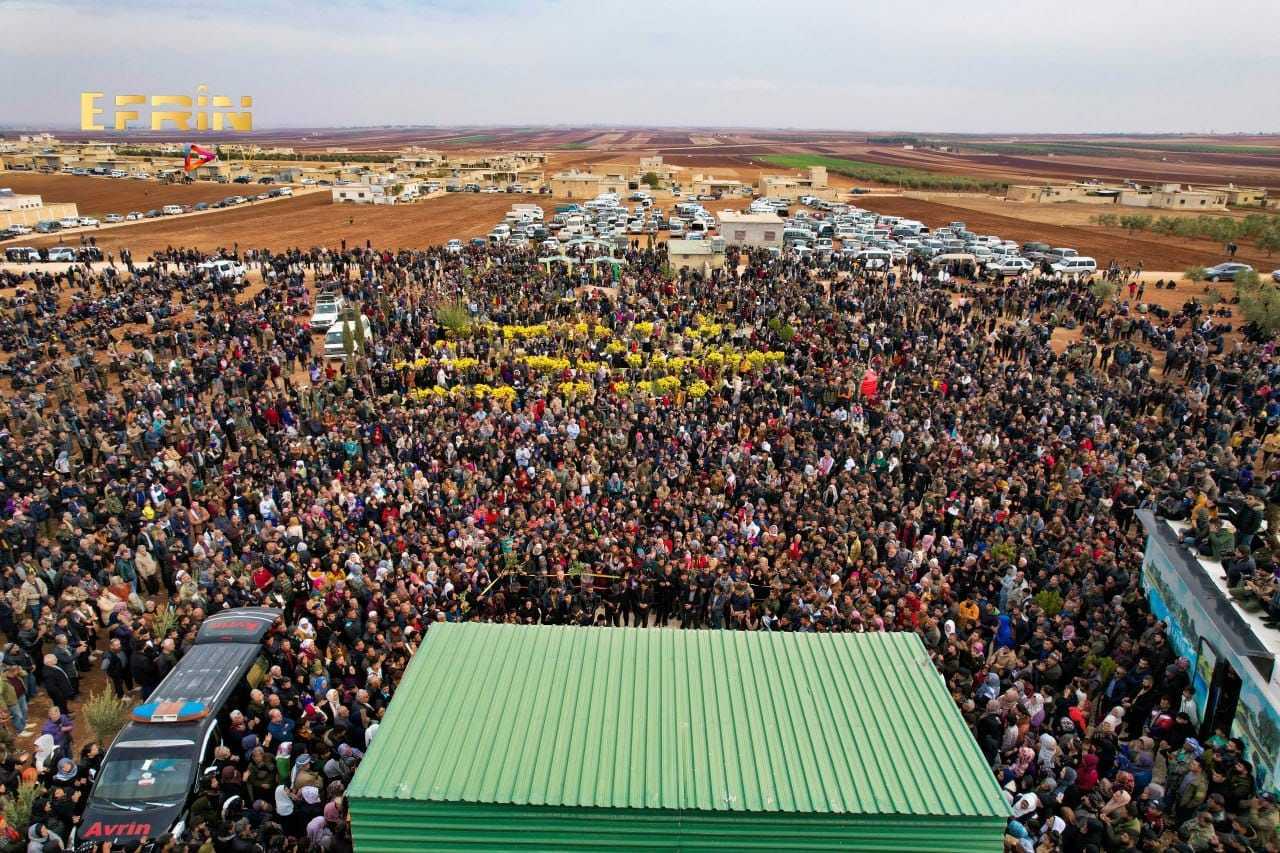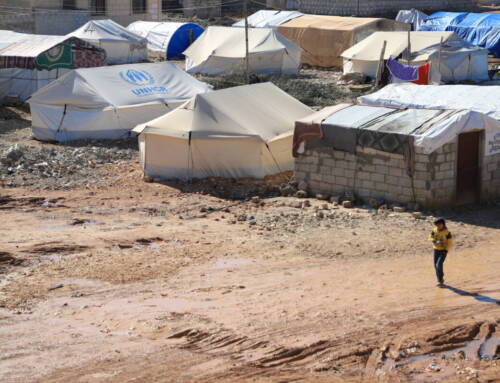Days of airstrikes and rumblings of a long-threatened Turkish offensive in northern Syria after Istanbul bombing
Ground shelling continued on Friday after days of heavy Turkish airstrikes on territory held by Kurdish forces in Syria and Iraq, while Turkish President Erdoğan renewed his vow to launch a long-threatened ground operation in northern Syria
25 November 2022
AMMAN — Turkish shelled territory held by the Syrian Democratic Forces (SDF) in Syria’s northern Hasakah and Aleppo provinces on Friday, following days of airstrikes targeting SDF areas along the border in a military operation launched by Ankara on November 20.
Turkish airstrikes this week, dubbed “Operation Claw-Sword,” were a response to a bombing in Istanbul on November 13 that killed and injured dozens of civilians. Turkey says the SDF was responsible for the attack, which the latter denies.
Since May, Turkish President Recep Tayyip Erdoğan, has vowed to launch a ground offensive against SDF forces in northern Syria to complete the creation of a “safe zone” along Turkey’s southern border with Syria. He renewed this pledge in a speech at an event in Istanbul on Friday, stating “God willing, we will complete this [security] belt from west to east.”
On Thursday, Turkish warplanes and drones targeted the Tigris Oil Station outside the Hasakah province town of al-Jawadiya, as well as grain silos in al-Qahtaniya (Tirbespî) and sites near Dukri village east of Qamishli, local pro-SDF media reported.
Erdoğan ordered the beginning of the Operation Claw-Sword air campaign against the SDF in Syria and the Kurdistan Workers’ Party (PKK) in northern Iraq on November 20. Turkish military aviation then struck stargets and headquarters belonging to the SDF along the border and deep in its areas of influence.
During four days of airstrikes this week, Turkish warplanes struck, for the first time, five SDF military sites in the village of Makman, in northern Deir e-Zor province, as well as the area surrounding the al-Hol camp, where more than 10,000 family members or affiliates of IS fighters are detained in the Hasakah countryside.
The SDF said in a statement on Wednesday that 11 members of its forces were killed, alongside 15 civilians and 25 Syrian regime forces, since the start of the operation. But Rami Abdulrahman, the director of the Syrian Observatory for Human Rights (SOHR) said the number of casualties is higher than has been announced. SOHR has documented the killing of 67 people in Syria and Turkey during the campaign, he told Syria Direct.
In SDF-territories, six civilians, including a journalist, were killed, as well as 23 members of regime forces and 30 members of the SDF, according to SOHR figures. In territories controlled by the Turkish-backed opposition Syrian National Army (SNA) in Azaz and the northern Aleppo countryside, five civilians, including a child, were killed by shelling coming from regime and SDF areas. And in Turkey, three civilians, including a child, were killed as a result of the Turkish border area coming under fire, Abdulrahman said.
Operation Claw-Sword came in direct response to the bombing of Istiklal Avenue, a busy pedestrian shopping area in Istanbul, on November 13 in which six people were killed and 81 injured. Ankara quickly accused the PKK and SDF of responsibility, which SDF commander-in-chief Mazloum Abdi denied.
Turkey considers the Syrian Kurdish People’s Protection Units (YPG), the main component of the US-backed Syrian Democratic Forces (SDF) in northern Syria, to be an extension of the Turkish Kurdistan Workers’ Party (PKK), listed as a terrorist organization by Turkey and the US.
Turkish airstrikes waned by early Thursday, as Ankara held talks with Russia and the US to discuss the situation in northern Syria. Russian Minister of Defense, Sergei Shoigu, spoke with his Turkish counterpart, Mevlüt Çavuşoğlu, by phone on Thursday. The same day, Turkey’s Minister of Defense, Hulusi Akar, met with US Ambassador to Turkey, Jeff Flake, at the ministry’s headquarters in Ankara. No details were provided regarding the reason for the visit or its results.
The Istanbul spark
Following the Istanbul bombing, Turkish security forces arrested the person accused of carrying out the attack: Ahlam al-Bashir, a Syrian citizen. Turkey said al-Bashir worked for the SDF and underwent military training in the Syrian city of Kobani (Ayn al-Arab).
After the arrest, Turkey’s Ministry of Defense vowed to the PKK and SDF to “eradicate them from this country and the region,” and launched Operation Claw-Sword. Ahmed Hamada, a defected Syrian general and military analyst, called the operation an official response to “strong reactions to the bombing inside Turkey.”
From Sunday to Wednesday, Turkish strikes targeted more than 48 sites along hundreds of kilometers of the Syrian and Iraqi borders with Turkey, Hamada told Syria Direct. The attacks reached 140 kilometers inside Iraq and 70 kilometers inside Syria, he added.
The SDF said in a statement on Wednesday that a total of 47 air raids, 20 drone attacks and 3,761 instances of shelling with various weapons took place during the same period.
Hamada expects Turkey’s operation to continue, “to exhaust and fragment these forces, separating the head from the body by targeting command and control centers and warehouses.”
Turkish journalist Celal Demir, for his part, accused “countries supporting the SDF and directing it to harm Turkey” of partial responsibility for attacks, referring to the US and European countries that provide military and political support to Kurdish forces in Syria.
The SDF ignites the fronts
In response to Turkey’s strikes, on November 20 SDF forces shelled Azaz city in the northern Aleppo countryside, controlled by the Ankara-backed SNA, as well as the Kaljibrin Turkish military base outside the city. Three civilians were killed and five others were injured.
The same day, SDF forces targeted the Turkish province of Kilis, across the border from northern Aleppo, with rocket-propelled grenades, injuring one soldier and two Turkish police officers. The SDF also targeted the Turkish border city of Karkamış on November 21, killing two civilians and injuring six others, according to Turkey’s Interior Minister.
Turkish President Erdoğan renewed his vow to launch “a ground operation in Syria to eliminate terrorism” on Tuesday, stressing “the military operations will not be limited to airstrikes.” Arab media sources have reported that Turkey instructed the SNA to raise combat readiness in preparation for an expected ground operation.
Analyst Hamada did not rule out the possibility of “a ground operation starting soon.” He called SDF shelling a “reaction” to Turkey’s bombing campaign, met by “another reaction from Turkey.”
Matai Hanna, the official spokesperson for the SDF-affiliated Syriac Military Council (MFS), which has forces deployed to fronts across Hasakah province, told Syria Direct on Tuesday that “the Turkish occupation has stepped up the pace of its air and artillery attacks, targeting several areas and leading to civilian loss of life and injury.” Turkish attacks this week also “caused significant and serious damage to service centers and infrastructure,” he said.
Hanna’s location came under artillery shelling while he spoke to Syria Direct. Hours later, he said northeastern Syria is living in a “war atmosphere.” This week, “Turkish aviation is targeting, for the first time, a joint military base of the [SDF] Anti-Terror Units and the [US-led] international coalition,” he added. The base is located between Tal Tamar and Hasakah city, 50 kilometers inside Syrian territory. Strikes on Makmak, 70 kilometers inside Deir e-Zor, were also unprecedented, he said.
He accused Turkey of targeting private property and essential services, including “a power station, grain silos, a COVID-19 hospital and other centers that serve the area’s people.”
In response to Turkish escalation in northern Syria, Russian President Vladimir Putin’s Special Envoy to Syria, Alexander Lavrentiev, called for Ankara to “exercise restraint” and refrain from any “excessive use of force on Syrian territory” to prevent “an escalation of tensions.”
In turn, the US State Department has called on Turkey “not to carry out such operations,” a spokesperson told the BBC in an emailed statement this week. The US has also asked “our Syrian partners not to launch attacks or escalate,” the spokesperson said.
*Correction 11/28/2022: Due to a typo, the original version of this report misstated the number of people injured in the November 13 Istanbul bombing as 61 people. Eighty-one people were injured in the attack. Syria Direct regrets the error.
**
This report was originally published in Arabic and translated into English by Mateo Nelson.







